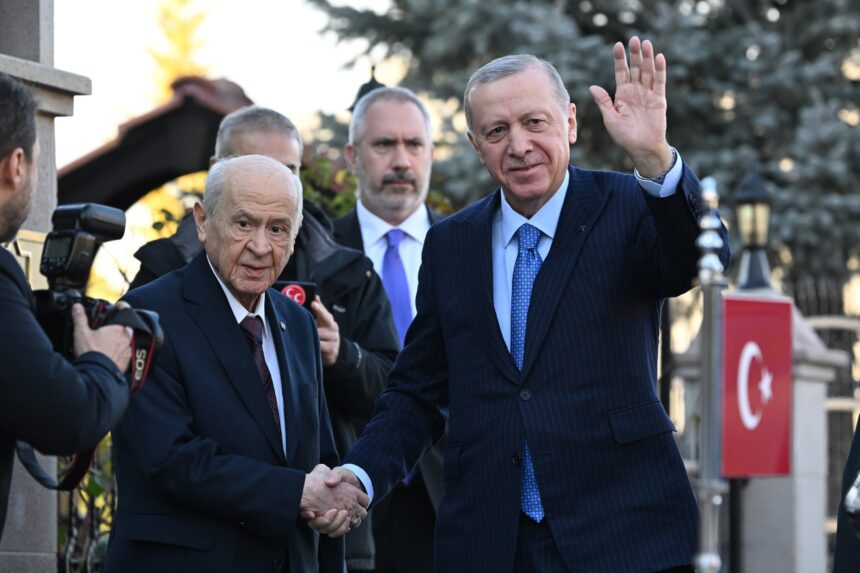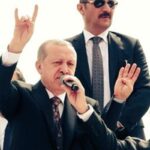Since his release from prison—widely seen as the result of Devlet Bahçeli’s direct judicial intervention—Mümtaz’er Türköne has consistently lauded his political savior with increasingly unrealistic claims and predictions. His narrative not only distorts the internal dynamics of Turkish politics but also misrepresents the broader geopolitical reality.
Türköne has made two particularly bold claims. The first—made shortly after Bahçeli’s symbolic handshake with DEM Party deputies—is that a new Kurdish peace process was launched not by Erdoğan, but by Bahçeli. The second, more recent claim is that Bahçeli might push for early elections this year if Erdoğan veers off course in the process. Both assertions are deeply flawed. They misread the structure of Turkish statecraft, misunderstand Erdoğan’s political instincts, and ignore the broader geopolitical forces shaping the current moment.
Not Bahçeli’s Handshake—But Erdoğan’s Calculation Under U.S. Pressure
Türköne’s assertion that the peace process began with Bahçeli’s “handshake” is a historical distortion. The reality is that this process was initiated with the knowledge, approval, and orchestration of President Erdoğan—not despite him. And it was done under a very specific kind of pressure: geopolitical necessity.
Contrary to Türköne’s romantic interpretation, the revival of the Kurdish opening was not born from domestic reconciliation or nationalist enlightenment. It was engineered under U.S. and broader Western pressure. But this time, it wasn’t about regional democratization or post-ISIS state-building. The stakes were higher.
The United States and its NATO allies increasingly view Turkey as a critical player in any future global alignment that pits the West against the growing China-Russia-Iran axis. In such a scenario, the West cannot afford a Turkey bogged down in internal unrest or Kurdish insurgency. Hence, the U.S. seeks an internally pacified, externally aligned Turkey—even if it’s ruled by an autocrat.
Bahçeli’s own political history hardly makes him a natural peacemaker. His party has historically thrived on anti-Kurdish sentiment, securitization policies, and ethnonationalist tropes. That he now appears aligned with a so-called “new nation-state project” speaks less to a personal transformation and more to his tactical accommodation of Erdoğan’s shifting priorities—and, perhaps, to foreign policy imperatives imposed from above.
To deliver this outcome, Erdoğan needed to de-escalate the Kurdish front, but without appearing to betray his nationalist base. That’s where Bahçeli comes in—not as the architect, but as the symbolic guarantor. Erdoğan strategically outsourced the optics of this shift to Bahçeli, enabling him to contain domestic backlash while signaling to Washington that Ankara was once again manageable.
In addition, the renewed Kurdish process began to gather momentum precisely during the period when Bahçeli was absent from the political stage due to health issues. Far from being its initiator, he was a late-stage participant whose involvement was largely symbolic and tactical—meant to preserve nationalist legitimacy for a process already set in motion by Erdoğan under Western pressure.
Why Early Elections Are a Fantasy—and the Real Tensions Lie Elsewhere
Türköne’s second major claim, which was made recently—that Bahçeli may call or request early elections if Erdoğan undermines the peace process—is equally detached from political reality. It ignores the basic power equation underpinning Turkey’s authoritarian coalition: the MHP has more to lose than gain from any premature rupture.
For nearly a decade, Bahçeli has occupied a disproportionate seat at the table in the executive-centered system, enjoying outsized influence over appointments, judicial processes, and security policies—all without bearing the full weight of electoral scrutiny. Early elections would not only risk this privileged status, but also expose the MHP to electoral decline at a time when nationalist voters are increasingly fragmented and ideologically fluid.
Moreover, the notion that Bahçeli—historically risk-averse when it comes to relinquishing state influence—would voluntarily trigger a vote that could undermine his control over the bureaucracy, judiciary, and law enforcement is far-fetched. It is Erdoğan who calls the shots, and Bahçeli’s role, for all its rhetorical drama, remains that of a junior partner who protects the status quo, not disrupts it.
Calling early elections to defend a peace process initiated by Erdoğan under U.S. pressure would be the political equivalent of self-sabotage. For a party that has mastered the art of exercising influence without responsibility, such a move would be wildly out of character.
It is true that tensions exist between the MHP and the AKP—and in fact, they always have—but these frictions lie elsewhere than where they’re often assumed.
Many within Bahçeli’s inner circle—including figures allegedly linked to the Sinan Ateş assassination—are now quietly maneuvering to shape the post-Bahçeli power structure. Their objective is not to destabilize the regime, but to preserve their influence in whatever political configuration follows Bahçeli’s eventual departure.
The recent statements from Bahçeli should not be misinterpreted as signs of a coalition breakdown. Instead, they reflect deeper institutional frictions: long-running bureaucratic turf wars, succession battles within the MHP, and increasing disagreement over who should ultimately inherit Erdoğan’s political legacy.
There is growing evidence that Erdoğan is discreetly preparing Meral Akşener to assume leadership of the nationalist bloc—consolidating it under his direct influence—while simultaneously positioning his son, Bilal Erdoğan, as his long-term successor. These quiet realignments have reportedly triggered serious unease within MHP leadership circles, who view them as an existential threat to their political autonomy, patronage networks, and decades-old grip over the machinery of the state.
Türköne’s Misunderstanding of Erdoğan’s Endgame
Türköne does make one valid observation: a sustainable peace process requires a return to the rule of law and democratic norms. But then he stumbles into wishful thinking—imagining that Erdoğan’s failure to democratize could be the reason the process collapses. This is backwards.
The problem isn’t that Erdoğan is incapable of fostering a democratic environment—it’s that he has never intended to, especially after the staged coup attempt in 2016, which provided him with the perfect pretext to entrench authoritarian rule. Since the collapse of the first peace process in May 2015 and his subsequent loss in the parliamentary elections a month later, Erdoğan has shown no interest in democratizing Turkey as a path to resolving the Kurdish issue. On the contrary, his strategy has been to address the Kurdish question without any democratic reform—by engaging with Abdullah Öcalan, a figure who, like himself, is authoritarian, ego-driven, and fundamentally disinterested in pluralism
In other words, Erdoğan seeks a top-down authoritarian settlement, brokered not through open institutions or civil society, but through mutual strongman politics. In Öcalan, he sees a reliable counterpart: centralized, hierarchical, ego-driven, and capable of controlling his base. In contrast, Kurdish democratic forces—such as the DEM Party—represent decentralized, pluralistic, and rights-based politics. That is precisely why Erdoğan has systematically crushed them.
Thus, Erdoğan doesn’t want a democratic Kurdish partner. He wants an authoritarian mirror image—someone who can speak on behalf of the Kurds without being accountable to them. In this model, Abdullah Öcalan becomes useful not as a representative of Kurdish aspirations, but as a controllable figure who, like Erdoğan himself, can deliver commands to a constituency without democratic mediation.
Türköne’s framework—where a return to democratic norms is seen as a prerequisite for peace—is not wrong in principle. But it misreads Erdoğan’s strategy entirely. Erdoğan believes he can achieve peace without democracy—not through liberal inclusion, but through a controlled pact between authoritarian actors. A compliant Öcalan fits that framework; a pluralistic Kurdish political movement does not.
This logic aligns perfectly with Erdoğan’s broader project: a dynastic autocracy, in which political stability is manufactured through elite bargains and top-down authority—not through democratic legitimacy or institutional renewal. The Kurdish question, in his view, is not a matter of rights to be recognized, but a threat to be neutralized through vertical alignment—preferably one that consolidates, rather than challenges, his rule.
Conclusion: Political Analysis, Gratitude Politics, or Just Staying Relevant?
Türköne presents Bahçeli as the architect of a “new republic” based on a renewed Turkish-Kurdish compact. This is a strange argument, coming from a man who has spent his career defending the old republic’s most exclusionary values. Bahçeli has never been a proponent of Kurdish rights, equality, or legal reform. His party has been a vocal enforcer of Turkey’s carceral nationalism, not a challenger to it.
To imagine that Bahçeli has suddenly transformed into a post-national statesman is not just naïve—it’s ahistorical. His participation in this new peace initiative is not visionary. It is transactional, strategic, and fully aligned with Erdoğan’s desire to manage Western expectations without loosening his grip on domestic power.
Therefore, Türköne’s post-prison commentaries increasingly read as political homage rather than critical analysis. His portrayal of Bahçeli as a savior of the republic and a champion of reconciliation whitewashes decades of authoritarian collaboration and ignores the political logic that actually governs today’s Turkey.
The peace process, if it is to mean anything, must be judged by its structure, not its symbolism. And the structure being built today is not one of democratic reconciliation—but of authoritarian containment.
If Bahçeli is playing a role, it is not as the architect of a new republic, but as its gatekeeper—ensuring that any change remains strictly within the confines of centralized control and regime continuity. And if Mümtaz’er Türköne truly wants to be seen as a political analyst rather than a rehabilitated apologist, he must stop mistaking loyalty, opportunism, or a desire to remain relevant in a system he once criticized for actual insight.
Let us not forget: this is the same Türköne who married one of his students, then used his AKP connections to help appoint her as a district governor, and later placed her on the AKP’s parliamentary candidate list. His career has never been just about ideas—it has also been about access, maneuvering, and proximity to power. Today’s lavish praise for Bahçeli follows the same pattern. It is not analysis—it is strategic indebtedness dressed as commentary.
By: News About Turkey (NAT)



